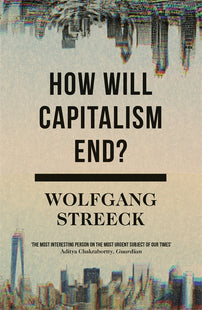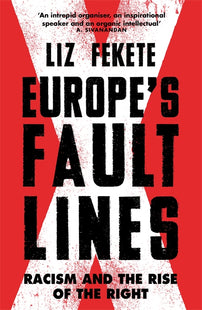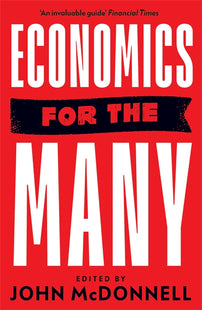John McDonnell is right: we need a new left internationalism
Recent debates on the British and the German left have reopened the question of the relation between socialism, the global economy, and the nation state. In this essay, Christine Berry argues that we must develop a new politics, one that is open to people but closed to global capital, for a truly radical left politics, and one that can overcome the resurgent far right.

In recent weeks, the question of how we build a left internationalism has been put back on the agenda – and about time too. In his speech to Labour conference, John McDonnell announced that the party will host an "international social forum" in the spring, “launching a dialogue on the common risks we face and the actions we need to take” – on issues like trade policy, climate change and tax avoidance. The current international order, he said, is broken:
“Over the past few decades that system has concentrated power in the hands of an international financial elite. Individuals, communities, and even nation states have been made increasingly powerless. It isn’t working for the Western world, where stagnant wages have helped feed the rise of the racist right. And it isn’t working for the developing world, whose wealth is plundered by multinational corporations or stashed in Western banks.”
A few days later, in a speech at the Marx Memorial Library, he put things more bluntly: “Socialism in one country won’t work.” If we are serious about transforming the economy at home, we need “a new Bretton Woods”. As he acknowledged, the prospects for that might seem bleak with Trump in the White House – but that only makes it all the more imperative for the left to begin building the international alliances and visionary new proposals that can push this agenda forward.
McDonnell is surely right about this. A Labour government committed to transforming the economy will find itself face to face with the might of the City, the Death Star of global high finance. The super-rich are already reportedly shifting their wealth – or even themselves – into tax havens to escape a future Corbyn government. And history tells us that, from Attlee to Mitterand to Syriza, global currency markets have been screwing left governments since time immemorial. Labour must prepare contingency plans at domestic level for these challenges – such as capital controls and emergency banking reforms. But it must also show international leadership in finding new global solutions that expand domestic governments’ room for manoeuvre.
It’s reassuring to know I’m not the only one losing sleep over this issue. Nor, it seems, is McDonnell. His speech quoted Gordon Brown, who recently expressed concern that the world is “sleepwalking into a future crisis” without the tools of international cooperation to deal with it: “in the next crisis a breakdown of trust in the financial sector would be mirrored by a breakdown in trust between governments.”
It’s to be hoped that McDonnell’s intervention will spark into life a debate that’s been worryingly absent from the UK left of late. But so far, the reaction seems to have been muted. Why are we so bad at talking about this stuff? Perhaps deep divisions over Brexit are to blame, but really this is only a symptom of a deeper problem. I think the contrast between Brown’s and McDonnell’s interventions provides a clue – and a glimpse of the way forward.
Brown diagnosed the problem as follows: “Countries have retreated into nationalist silos and that has brought us protectionism and populism. Problems that are global as well as national and local are not being addressed.” This comes straight from the centrist-liberal playbook: the use of ‘populism’ as a dirty word (implicitly equating left and right populism), the unexamined assumption that ‘protectionism’ is to be condemned. Open versus closed has joined left versus right as a great dividing line of our times, we are told. Almost always, the implication is: open good, closed bad.
The problem is that this fails to take seriously the very reasons these seismic political shifts are happening in the first place: the failures of neoliberal globalisation. Free trade was supposed to benefit all, but in reality it has mainly benefitted transnational corporations who can offshore labour to wherever it’s cheapest and play national governments off against each other, decimating whole sectors and communities in the process. Unfortunately, when it comes to acknowledging this, the loudest voices on the left tend to be those that fixate on immigration and try to outflank the racist right. The new German movement ‘Aufstehen’, conceived as a way to counter the rise of the far-right Alternative fur Deutschland (AfD), is a good example. Its stated aim is to shift German politics to the left, but it appears to see solidarity with migrants as a sacrificial lamb in this endeavour. Most of its leading figures, such as Sahra Wagenknecht of Die Linke, are known for their anti-immigration stance.
In both Germany and the UK, this polarisation has toxified the debate. Any conversation about how national left governments should relate to the global economy tends to quickly descend into people shouting ‘Nazi!’ and ‘neoliberal!’ at each other. I’m forcibly reminded of the ugly spat that took place last year between Wolfgang Streeck and Adam Tooze on the letters page of the London Review of Books. I argued then, and I still believe, that we need to go beyond unhelpful binaries about ‘open versus closed economies’, or ‘pro versus anti globalisation’. We are not faced with a simple choice between neoliberal internationalism and xenophobic nationalism. We can do better than that.
Absolutely, let’s blame globalisation for its part in people’s problems. Let’s call out the neoliberal dogma that said throwing open our economies would make everything more efficient, and that the jobs and communities devastated along the way were just collateral damage. But let’s be crystal clear that this is not the same as blaming immigrants. In fact, instead of talking about ‘globalisation’, why don’t we call a spade a spade and talk about global capital? Why don’t we start talking about how to build a politics that is open to people but closed to extractive finance?
McDonnell’s speech points to precisely such a way forward. It’s no accident that his critique, unlike Brown’s, is of the global economic system and not just of post-crisis nationalism. Indeed, he rightly diagnoses the latter as a symptom of the former. And yet it is also unashamedly a call to international solidarity, stressing that the system is not working for ordinary people either in the developed or the developing world, but only for economic elites. Instead of drawing dividing lines between nation-states, we can draw our dividing lines where the left should always draw them: between the powerful and the powerless, between global capital and global labour. From this starting point, we can have a more fruitful conversation about to rebalance power at the global as well as the local and national level.
A comment from Sahra Wagenknecht of Die Linke illustrates the dangers of conflating openness to people with openness to capital. “In a world with no borders,” she says, “it is the multi-national corporations who have the power.” This may be true of free movement of capital, but is it really true of free movement of people? And if it is, does it have to be? Is it not possible to imagine how we might both restrict the flow of speculative and exploitative finance capital, and stand up to its demands to erode labour standards?
Likewise, Streeck, one of Aufstehen’s leading intellectual supporters, accuses the pro-immigrant left of “abandon[ing] a central element of its historical pro-regulation agenda”, and embracing a neoliberal “deregulatory” agenda. I can’t speak for the German left, but in relation to the UK left this is clearly a straw man, equating regulations on labour (i.e. people) with regulations on capital (i.e. corporations). But regulating people’s right to move around is clearly different from regulating corporations’ ability to exploit them. It’s not immigrants that drive down wages – it’s the overbearing power of footloose global capital, and the economic crises it produces. Indeed, most of those on the left who argue for free movement also favour strong measures to re-regulate labour markets and reverse the global ‘race to the bottom’ on employment rights. Being pro-migrant is not a deregulatory position.
Conversely, the Tories’ post-Brexit immigration plans are a perfect illustration of how curbing free movement can go hand in hand with skewing power even further towards capital and away from labour. Since migrants – contrary to anti-immigrant tropes – are critical contributors to the economy, the Tories will be forced to accept continued immigration, but its terms will be increasingly dictated by big business and a repressive state. Strict limits on ‘unskilled’ migration (read: anyone earning less than £50k a year) will be balanced with employer-sponsored visa schemes to fill the resulting gaps in critical sectors like fruit-picking, leaving already disempowered workers even more vulnerable to exploitation. Meanwhile, new rules will put even so-called ‘skilled’ workers ever more at the mercy of their bosses, for instance by needing an employer sponsor to bring family members. Make no mistake: this is not a pro-worker, pro-regulation agenda.
Rather than blaming immigrant workers for low wages in unskilled jobs, then, we must aggressively take on the forces of transnational capital which are truly responsible. This means a new left politics on trade - rejecting trade deals that give corporations the power to veto labour legislation, and WTO rules that stop local governments from protecting local jobs. It means international action to tackle tax avoidance, and to rein in the financial centres that enable it. It means breaking up global mega-banks, forcing them to hold more capital and regulating their financial weapons of mass destruction. It means relegitimising capital controls.
Crucially, it means a new international currency regime. The dire experience of Greece has focussed attention on the need for this at the level of the eurozone, with figures such as Yanis Varoufakis putting forward proposals for radical reform to rebalance power between surplus countries (like Germany) and deficit countries (like Greece). But the need for such thinking does not depend on the fate of the euro, nor is it limited to countries that share a currency. Varoufakis’ proposals are based on those Keynes put forward at Bretton Woods in 1944, for what he envisaged as a global solution. What would it look like to imagine a radically new global currency regime, one that redressed global imbalances and created more space for domestic left governments across the world?
More generally, what would it look like to imagine new forms of international co-operation that solve the real problems of our time – taxing global wealth, regulating high finance, tackling climate change? Paradoxically, moving beyond neoliberal globalisation does not mean retreating inside national borders: it hinges precisely on our ability to forge a new vision for the governance of the global economy. The terms of the debate between ‘nationalism’ and ‘internationalism’, as well as the fixation on immigration, have hamstrung the left from doing this. Labour’s newly declared interest in building a new global economic settlement could help to break the impasse.
Of course, none of this is exactly doorstep politics. (Having said this, it’s worth noting how much political hay Trump made from promising to renegotiate trade deals and take on the banks – however hollow and problematic these promises were.) Whilst doing these things might address the grievances driving people into the arms of the far right economically and in the long term, that doesn’t mean it will do so politically and in the short term. This is presumably the calculation that has led the people behind Aufstehen to conclude that they need to tack right on immigration. But this is a dangerous mistake.
Ultimately, as Laclau and Mouffe – key influences on the new European left populism – argued, movement building is about forging new shared political identities. At this historical juncture, the European left faces a critical choice about how to do this. From Aufstehen to Blue Labour, left anti-migrant voices tend to paint the divide between those who are pro- and anti-immigration as one between middle class, cosmopolitan liberals and the working class base they have abandoned. But this is in itself an act of political identity construction: it erases migrant workers and refuses the possibility of solidarity between migrant and non-migrant workers. In reality, ‘working class’ here is code for that most problematic and insidious of political categories, ‘white working class’.
A truly transformative left politics must be based on solidarity with the woman of colour whose life is made unsafe by the rise of the far right, and the immigrant child drowning in Mediterranean seas, every bit as much as the exploited worker in a post-industrial town or the unemployed family forced to rely on food banks. These are all our people. Crucially, they may well be the same people. To draw dividing lines between them is to play into the hands of the far right. It is a dangerous mistake, both politically and conceptually.
But there is an alternative political strategy for taking the sting out of anti-immigrant politics. It is to forge political identities that unite these groups based on common cause – as workers being exploited by their bosses, as tenants being exploited by their landlords, as debtors being exploited by their banks – rather than dividing them based on race or nationality. To do otherwise is to behave as though German- or British-born people have a monopoly on economic hardship, when in fact immigrants are among those most likely to suffer from these exact same problems.
Most importantly, we can’t do this purely at the level of political discourse, and if we try, we shouldn’t be surprised if it seems not to work. As Ash Sarkar powerfully argues, we must do it on the streets and in communities. We must do it through housing campaigns, drop-in centres and cultural events. We must do it through a politics that directly addresses the day-to-day issues people face, and that gives them lived experience of working and fighting alongside those they are told to blame. And it must go hand in hand with vigorously opposing fascists wherever we find them. This is how the left revitalises itself, not through dog-whistle politics on immigration – which, as we have found to our cost in the UK, serve only to give oxygen to the far right and to normalise their politics.
The Corbyn leadership’s rhetorical stance is a welcome shift from the days of ‘controls on immigration’ mugs, but its policy stance remains one of strategic ambiguity, and many migrant activists remain frustrated at its reluctance to go further. (This makes the UK context very different from the German one, where Die Linke has maintained an uncompromising open-borders stance.) Some are prepared to give it the benefit of the doubt as long as it delivers once in office. But it’s increasingly clear that we cannot wait until then. A new economic internationalism may be critical, but it does not remove the need for a strongly anti-racist, pro-migrant politics at home. It is not enough to avoid fuelling the rise of racist xenophobia: we must actively resist it.
Ultimately, this is not a debate between idealism and pragmatism. It’s about where we choose to be bold and radical, and where we choose to triangulate. Aufstehen are far from being the only leftists to insist on the need to reimagine the boundaries of the politically possible when it comes to austerity, but to urge “political realism” when it comes to immigration. We should be crystal clear that this is a political choice: it’s about priorities, about where we choose to expend political capital and where we choose to hoard it. And in a world where racist attacks are on the rise, where neo-Nazis can march openly in the streets and the President of the USA can lock immigrant children in cages, it’s the wrong choice.
Wolfgang Streeck is right about one thing, though: pro-immigration left politics reveals an (in my view healthy) ambivalence towards state power. (McDonnell himself is fond of citing the 1970s pamphlet ‘In and Against the State’, which declared, “It is the state’s resources we need – its relations we don’t.”) If the new left - influenced by both socialist and anarchist traditions - wants both stronger democratic direction of the economy and weaker enforcement of borders, it needs to tackle head-on its love-hate relationship with the nation-state. It needs to think more seriously about the relationship between national and international democratic governance. It needs to debate the role and limits of the nation-state in democratising a globalised economy and in achieving global social justice. And it needs to envision new forms of international and global co-operation that can meet these aims. McDonnell’s conference speech was a much-needed wake-up call to the left in this regard. It’s time for us all to heed it.
Christine Berry is a freelance researcher and writer and was previously Director of Policy and Government for the New Economics Foundation. She has also worked at ShareAction and in the House of Commons.
[book-strip index="1" style="display"]

